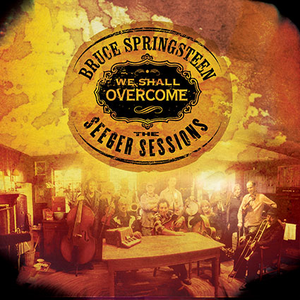
Published on May 10, 2006
Bruce Springsteen has the maddening ability to craft
mind-blowingly brilliant albums and make music with no soul at all.
For every Born To Run, there has been a Devils &
Dust, and when I first heard the concept for We Shall
Overcome, there was no doubt in my mind it was going to be one
of the latter.
First off, why the hell did The Boss feel the need to
record an album of all covers? He’s one of the greatest songwriters
of the rock era, making this seem lazy. And second, why pick
nothing but incredibly old folk/country tunes? Surely this was just
an exercise in indulgence, another stab at an “important” record,
as Daily Vault Editor Jason Warburg might say.
Sweet Baby James, how horribly wrong I was. This is a
brilliant record that very few artists could have pulled off. Maybe
it lacks the emotional resonance of The Rising, or the
fist-pumping arena rock anthems of Born In The U.S.A., but
We Shall Overcome is easily one of Springsteen’s best albums
since Born To Run, as well as my first candidate for album
of the year.
Admittedly, if I had given this disc a spin a few
months ago, the praise would not have been gushing forth as it is
now. I simply did not have the appreciation for this kind of music.
But thanks to my excursions into the music of Johnny Cash, Dylan,
and a gaggle of other country/folk singers, the songs off We
Shall Overcome speak to me.
This is music that one simply doesn’t hear on the
radio or watch on American Idol. Music like this is the
roots from which all that we listen today came from. Where
Springsteen pulled off the coup is in somehow keeping things from
descending into hokiness. A song like “Froggy Went A’ Courtin'”
provides the opportunity to do just that, but coming from The Boss
it sounds as natural as anything else he has recorded.
We Shall Overcome‘s greatest selling point is
the unbridled energy and joy the musicians obviously had towards
this material. I don’t think Springsteen has had that much fun
recording an album since his early days. Most of the tracks turn
into a virtual group vocal session, capturing that spirit of
sitting around the campfire or a barn dance. We Shall
Overcome was basically recorded in two days, so there is a
definite looseness that permeates the record, and it’s amazing it
comes off as coherent as it does. The backing band sounds like it’s
been playing for years, in a brilliant display of chemistry.
While I would say folk music is the primary genre on
We Shall Overcome, you can hear so much more. One of the
best cuts off the disc, “Mrs. McGrath” is a reworking of an old
Irish anti-war ballad. “Oh Mary Don’t You Weep” is a blast of
gopsel, and the backing singers are enough to make a heathen
convert right there and then. The title track is delivered in
bravado worthy of one of the greatest protest songs ever
recorded.
While there is a jovial mood for most of the record,
things do turn dark. The aforementioned “Mrs. McGrath” mourns for
her son’s physical losses in war. “Eyes On The Prize” offers up
hope in the face of hopelessness. The burning intensity of this
track sent shivers down my spine, both because of the slow
plaintive cry of the fiddle and the subtle gospel-style vocals in
the background.
Still, in the end We Shall Overcome reaches
its pinnacle when Springsteen taps into his early 70s mode. Though
the music may sound nothing like that of Greetings From Asbury
Park, it shares a certain kind of musical fellowship. I don’t
believe We Shall Overcome was made with the intention of
projecting some kind of statement on the public; instead, it is
Bruce Springsteen making the kind of music he wanted to make and
succeeding in every aspect. Don’t miss out on this one.